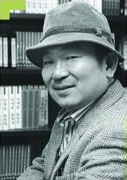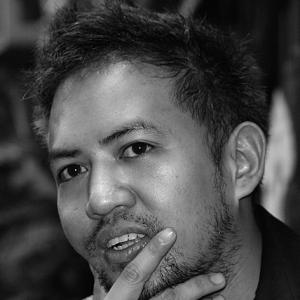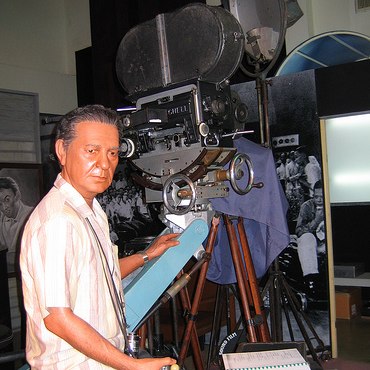AsiaPacificFilms.com streams culturally and historically
significant films from Asia and the Pacific to entertain, educate and
inspire viewers. With the latest streaming technology, subscribers have
unlimited access to our films in DVD quality.
Spotlight
on 3 Master Asian Filmmakers
Three filmmakers whose films are available online through AsiaPacificFilms.com are profiled in this issue: Kim Dong Won from Korea with 11 films, Khavn De La Cruz from Philippines with 10 shorts, and the important Thai film director, Ratana Pestonji.
Read on for the profile essays on each of these master filmmakers.
Kim Dong Won, 11 of his Korean documentaries streaming on AsiaPacificFilms.com
An Uncommon Sense
By Philip Cheah

(Photo Credit: Korean Film Directors by Jung Han-seok)
One night, on the streets of Jeonju in South Korea in
2009, I had a rambling discussion with documentary director, Kim
Dong Won, about the ridiculous conventional thinking regarding the issue of
copyrights. He laughed out loud and yelled,"I don't believe in copy
right. I believe in copy left." That's why this series of Kim Dong Won
films are appearing here on the AsiaPacificFilms.com website even though
the Kim Dong Won box set was ONLY released this year. For Kim, the
copyright issue must never be used to stop the flow of culture and
information. Even if it makes more sense to have a space between
release dates on different platforms, Kim just wants the truth to get
out there.
In many ways, this kind of spontaneity led him to
become the godfather of Korean documentaries. In the early 80s, Kim
was helping in the film industry of Chungmuro (Korea's main film
production centre). He had completed his rarely-seen debut short film, James' May,
in 1986, which reflected his Roman Catholicism. That same year, a
Catholic priest asked Kim to film the Sanggye-dong district, which was
earmarked for demolition, as 'evidence' for an impending court case.
While intending to film for just one day, he had to return due to a
sound problem. Coincidentally, he witnessed gangsters terrorizing the
villagers violently in order to scare them away from their own homes.
His conscience was pricked and the result was his first important work,
The Sanggye-dong Olympics (1988), which showed how the dictatorship of
Chun Doo-hwan, needed to mask the regime's corruption by relocating the
poor before the 1988 Seoul Olympics.
 In the following films, Standing on the Edge of Death (1990),
Haengdang-dong People (1994) and Another World We're Making (1999), Kim
was to continually return to the subject of the victimization of the
poor. However, Kim was not a conventional thinker. He did not set out to make
agit-prop films. As film critic, Jung Han-Seok observed, "He does not
include any interviews with the opposing camp, government officials, for
instance, who are responsible for housing policies. Neither does he
antagonistically juxtapose the positions of the government and the
residents in an argument. In sequence, the regional peculiarity and
self-governance among the residents are much more strongly emphasized."
In the following films, Standing on the Edge of Death (1990),
Haengdang-dong People (1994) and Another World We're Making (1999), Kim
was to continually return to the subject of the victimization of the
poor. However, Kim was not a conventional thinker. He did not set out to make
agit-prop films. As film critic, Jung Han-Seok observed, "He does not
include any interviews with the opposing camp, government officials, for
instance, who are responsible for housing policies. Neither does he
antagonistically juxtapose the positions of the government and the
residents in an argument. In sequence, the regional peculiarity and
self-governance among the residents are much more strongly emphasized."
Interestingly, Kim has only made two films - We Will Be One
(1995) and One Man (2001) - profiling a single person. Both are
religious figures and these films reflect Kim's interest in how faith
relates to social action.
 While Repatriation (2003) is generally acknowledged as his
masterpiece, an earlier work of genius was really The 6 Days Struggle at the
Myeong Dong Cathedral (1997). As usual, Kim avoids conventional thinking
by arguing that the sit-in strike that became a nationwide protest in
1987 was really a failed revolution. While 1997 was the year for
Korea's presidential elections, the film tries to understand what led
the strike leaders to call off the protest from a viewpoint a decade later.
Kim argues that the more fundamental reforms for the poor were traded
off for so-called democratic direct elections. As Kim said, "Common
sense tells us common people have privileges. Poverty makes them fair
and clear-minded. In reality, the haves are the thieves and Christianity
is not the only religion that emphasizes poverty. Confucianism also
values genuine poverty."
While Repatriation (2003) is generally acknowledged as his
masterpiece, an earlier work of genius was really The 6 Days Struggle at the
Myeong Dong Cathedral (1997). As usual, Kim avoids conventional thinking
by arguing that the sit-in strike that became a nationwide protest in
1987 was really a failed revolution. While 1997 was the year for
Korea's presidential elections, the film tries to understand what led
the strike leaders to call off the protest from a viewpoint a decade later.
Kim argues that the more fundamental reforms for the poor were traded
off for so-called democratic direct elections. As Kim said, "Common
sense tells us common people have privileges. Poverty makes them fair
and clear-minded. In reality, the haves are the thieves and Christianity
is not the only religion that emphasizes poverty. Confucianism also
values genuine poverty."
Thanks to his uncommon sense, the majority of Kim Dong Won's classic
documentaries are now proudly available on Asia Pacific Films.com.
Click on the images below to watch a preview of each film from Kim Dong Won.
|
|
|
James' May
15m
Released: 1986
Language: Korean
Theme: Religion
Genre: Short
This film explores the
existential anguish for life and one’s own existence, themes that
trouble many young people, and searches for resolution via the
expansion of sight over religious view. The director’s first film looks
at the meaning of baptism through high school senior Ki-sang, whose
Christian name is James and who is unable to come to terms between the
teachings of Jesus and his own existence and circumstance. |
Sanggye-dong Olympics
28m
Released: 1988
Language: Korean
Theme: Social & Economic Issues
Genre: Documentary
When South Korea hosted the 1988 Summer
Olympics, the event was depicted in the media as historical but those
living on the outskirts of the capital felt disconnected from the
happenings of the Olympics. The poor Sanggyendong residents living in
the slums around Seoul were being displaced in redevelopment
projects aimed at giving the outside world the correct image of Seoul, but they did not give up hope. A groundbreaking documentary, it
expanded the territory for the independent film industry. |
Standing on the Edge of Death
30m
Released: 1990
Language: Korean
Theme: Social & Economic Issues
Genre: Documentary
An indictment of the misconception
that the poverty is due to the poor’s idleness, this film looks at
1991's sharp rise in consumer prices and rent that led to the urban poor
and many families committing suicide in increasing numbers. Despite
their life of hard labor from dawn to dusk, the urban poor are unable to
escape their eternal impoverishment. Meanwhile the upper classes loos on with
a lack of understanding as to why people would kill themselves over a
rent hike.
|
| |
|
|

|

|
 |
God Saw That It Was Good
54m
Released: 1991
Language: Korean
Theme: Ecology & the Environment
Genre: Documentary
This environmental film begins with a verse from the Book
of Genesis in The Bible. The scenes depict images of destroyed
environments: polluted air, stale water, and contaminated soil, and
compares the beauty of the planet as it was created by God versus the
continuing decay caused by everyday habits like excessive use of cars
and disposable products. Planned by the Catholic Church Committee for
Justice and Peace, the documentary urges reflection through “shock
therapy” and looks at environmental issues through a religious lens. The
film urges a private-public partnership to solve the problems
associated with environmental degradation. |
In The Forest of the Media
39m
Released: 1993
Language: Korean
Theme: Family & Relationships
Genre: Documentary
The mass media as the center of daily life
is detailed in this documentary, it explores whether the condition of
people’s lives remain sound with the television as a core part of life
with adults mimicking the fashions of the famous and children jumping
off rooftops as they imitate Tarzan. Is society better off in this era
of video images and media? |
Haengdang-dong People
31m
Released: 1994
Language: Korean
Theme: Social & Economic Issues
Genre: Documentary
This film continues the director’s interest
in the urban poor first explored with Sanggyen-dong People. A 1993
redevelopment by the South Korean government of shanty town districts to
make room for high-rise apartments provides the backdrop for
Haengdang-dong residents to create their own system of community and
becomes an alternative way of life. While the government uses similar
tactics similar to the story of the Sanggyen-dong People to force
displacement and demolition, the Haengdang-dong story turns out different
because of the strong organization of Haengdang-dong. |
| |
|
|
 |
 |
 |
We'll Be One
43m
Released: 1995
Language: Korean
Theme: Law, Politics & Government
Genre: Documentary
The book by the Rev. Moon Ik-hwan entitled “We Will Be One” details his
lifelong commitment to the unification of North and South Korea. The
film begins with Rev. Moon’s 1989 visit to North Korea and chronicles
the half-century unification movement. |
The 6 Days Struggle at the Myeong Dong Cathedral
76m
Released: 1996
Language: Korean/English
Theme: Law, Politics & Government
Genre: Documentary
On June 10, 1987, riot police chased hundreds of student protesters
around Myeong-dong Cathedral leading to a spontaneous sit-in along with
other citizens. The film examines the six days of the sit-in and the
events that led the protesters to disperse suddenly and the subsequent
political implications of the June Contention more than a decade later.
Director Kim explores this subject matter from a different perspective
than his previous documentaries, looking at the history more
objectively than sentimentally. |
Another World We're Making: Haengdang-dong People 2
42m
Released: 1999
Language: Korean
Theme: Social & Economic Issues
Genre: Documentary
The saga of the Haengdang-dong people’s drive – as well as Director
Kim’s – toward a sense of community continues in this documentary that
details the residents’ creation of a new town called Songkak Village,
offering a sense of hope to people’s of other demolished communities and
while also addressing society’s goals of living a decent life. |
| |
|
|
 |
 |
|
One Man
50m
Released: 2001
Language: Korean/English
Theme: Religion
Genre: Documentary
Like other foreign missionaries, Father Roberto Seo dedicated his life
to the democratization of Korea, and his spirit is at the
heart of this documentary. He is a complex character with contrasts
and contradictions and this documentary helps the audience understand
this man’s life in depth. This film is not as well-known but is said to
be a good gauge of understanding Director Kim. |
Tekken Family
12m
Released: 2001
Language: Korean
Theme: Family & Relationships
Genre: Documentary
The video game of “Tekken” becomes the venue through which Director Kim
explores the fundamental meaning of family during a time when the family
is being picked apart. The father is a film director who films his
family while they are playing the game of Tekken and asks them several
questions including which is their favorite Tekken character. |
|
Khavn De La Cruz, 10 of his films streaming on AsiaPacificFilms.com
108 Films and Still Counting
By Philip Cheah

(Photo Credit: Doc Alliance Films)
No filmmaker best expresses the Godard myth, that "if you have only
one dollar then make a film for one dollar", than Philippines' Khavn De
La Cruz.
Up to this point (and based on Khavn's book: Philippine New Wave -
This is Not a Film Movement, MovFest, 2010), Khavn has made 108 films
inclusive of shorts and features.
No, Khavn's not an old guy. Born in 1973, he started directing in
1994. Between 1999 and 2009, he directed 25 features. In Spain, as a
challenge, he made 12 shorts in less than a week. Most of his shorts are
shot in a day to save costs and, as he puts it, "to maintain a
certain energy level."
Actually, when you watch his films, you can feel a manic energy. Not
every film will give you the same level of satisfaction and it's
obvious that some films work better than others do. However, his energy level
relates to Khavn's various influences - "I never wanted to grow up and
be a filmmaker. I wanted to be a zoologist because I wanted to draw
animals. I wanted to be a concert pianist at some point. Then a poet."
 And it's all there in his films. Squatterpunk (2007) shows his music
roots. In fact, this wordless document on slum life is best
experienced as a concert film, with Khavn's band, The Brockas, rocking
along on the soundtrack. His writing influence is found in his
adaptation of Norman Wilwayco's award-winning book, Mondomanila (2004).
For sheer genre madness, there's the horror deconstruction, Three Days
of Darkness (2007) or The Vampire of Quezon City (2006). As for Khavn's
attraction to black comedies, he provides a Filipino variant of it - the
brown comedy, which satirizes social mores, found in Little Brown
Comedies (2009).
And it's all there in his films. Squatterpunk (2007) shows his music
roots. In fact, this wordless document on slum life is best
experienced as a concert film, with Khavn's band, The Brockas, rocking
along on the soundtrack. His writing influence is found in his
adaptation of Norman Wilwayco's award-winning book, Mondomanila (2004).
For sheer genre madness, there's the horror deconstruction, Three Days
of Darkness (2007) or The Vampire of Quezon City (2006). As for Khavn's
attraction to black comedies, he provides a Filipino variant of it - the
brown comedy, which satirizes social mores, found in Little Brown
Comedies (2009).
As a true believer of Philippines cinema, he takes apart Lino
Brocka's classic Manila: in the Claws of Neon (1975), with his own movie
Manila in the Fangs of Darkness (2008) as a tribute to Brocka's actor,
Bembol Roco, who also appears here.
"Films combines all other art forms until it becomes something else
with a life of its own," says Khavn, "pop films with radical ideas and
avant-garde films with pop sensibilities. That's more interesting than
the usual shallow pop films and difficult experimental films."
Click on the images below to watch a preview of each film from Khavn De La Cruz.
Ratana Pestonji, 5 of his films streaming on AsiaPacificFilms.com
Thai Master Filmmaker, Ratana Pestonji
By Philip Cheah

(Photo Credit: Thai Film Journal)
"We, who were born in the 70s and grew up in the 90s, were able to
see only the poster of Ratana Pestonji's
Country Hotel and hear the
elders tell us about how great that film was. Many critics rated it as
one of the best in Thai film history. Like other old films made
before the National Film Archive was established, it was thought lost.
"I found later from the list of the negatives that came back from
Rank Laboratory in England that all Ratana Pestonji films were there,
including Country Hotel...
"When I saw this film for the first time I was amazed. It was not at
all, what I had expected. From the title which is supposed to mean 'Hell
Hotel', I expected a suspense thriller, or something horrifying. It
turned out to be one of the most hilarious films I have ever seen. It
is set in a country hotel where anything and everything can happen -
from Italian to Chinese opera, from wrestling to bull fighting. There is
only one guest room in this hotel which is occupied by Chana (actor
Chana Sri U-bon) who is driven crazy by the happenings. Therefore, he renames
the hotel 'Hell Hotel'. A two-hour-and-twenty-minute film on a single
set is not easy to deal with, but Pestonji succeeded in keeping the
audience with him all the time." - Film critic, Chalida Uambumrungjit
(Thai National Film Archives).
And that's not ALL! Asia Pacific Films.com is proud to present five
films by Ratana Pestonji. Besides Country Hotel (1957), we are also
streaming Forever Yours (1955), Dark Heaven (1958), Black Silk (1961) and Sugar is Not Sweet (1965). These films are extremely RARE and they
are online for the first time.
Click on the images below to watch a preview of each film from Ratana Pestonji.
|
|
|
Forever Yours
107m
Released: 1955
Language: Thai
Theme: Gender & Sexuality
Genre: Romance |
Country Hotel
148m
Released: 1957
Language: Thai
Theme: Gender & Sexuality
Genre: Romance |
Dark Heaven
102m
Released: 1958
Language: Thai
Theme: Gender & Sexuality
Genre: Romance |
| |
|
|

|

|
|
Black Silk
129m
Released: 1961
Language: Thai
Theme: Philosophy & Ethics
Genre: Romance
|
Sugar is not Sweet
134m
Released: 1965
Language: English
Theme: Gender & Sexuality
Genre: Drama |
|
About Phillip Cheah

The three profiles above were written by Phillip Cheah, film curator for AsiaPacificFilms.com. Phillip Cheah is a film critic and is the editor of BigO, Singapore's only independent pop culture publication. He is Honorary Secretary of NETPAC (Network for the Promotion of Asian Cinema). He is program consultant for the Jogja-NETPAC Asian Film Festival, the Cinema Digital Seoul Film Festival and the Dubai Int'l Film Festival. He is also Advisor for the 1st Vietnam Int'l Film Festival. He is co-editor of the books: Garin Nugroho's And the Moon Dances, Noel Vera's Critic after Dark and Ngo Phuong Lan's Modernity and Nationality in Vietnamese Cinema.
New Films from the Middle East
Our film library is constantly expanding. AsiaPacificFilms.com recently acquired the rights to these Iranian films:
Click on the images below to watch a preview of each film.
|
|
|
Red, White And The Greens
58m
Released: 2009
Language: Farsi
Theme: Law, Politics & Government
Genre: Documentary
Iranians weigh in on the upcoming 2009 presidential election.
Director: Nader Davoodi |
Twenty
85m
Released: 2009
Language: Farsi
Theme: Family & Relationships
Genre: Drama
Mr. Soleimani has been advised by his psychologist to close down his reception hall. Therefore, he announces to his staff, that he will be closing the hall in twenty days.
Director: Abdolreza Kahani |
Ashkan, the Charmed Ring and Other Stories
90m
Released: 2009
Language: Persian
Theme: Family & Relationships
Genre: Drama
The many characters in this film meet, showing the causality of each of their actions.
Director: Shahram Mokri |
In addition, we will be uploading ten documentaries in the next few weeks by the famous Palestinian filmmaker Mai Masri who was born in Jordan in 1959. She developed an interest in film and photography during her high school years in Beirut and received a film degree from San Francisco State University. Masri has directed and produced several award-winning films that look at women's and children's lives in situations marked by conflict, uncertainty, and crisis. Her films have won several awards including first prize in the Institut Du Monde Arabe Film Festival in Paris, best documentary award at the Asian Pacific Film Festival, best documentary in the Valladolid International Film Festival in Spain and a Special Tribute at the Ismailia Festival in Egypt in 2006.
Visit our site often as we keep adding new films from
all of Asia. Check AsiaPacificFilms.com for our ever
growing film library of films from Asia and the Pacific.
Contact us Now for University and Library Subscription Rates...AND a Free Pass to Explore our Full Online Film Library
If you are an Educator, Librarian or head an organization – we offer group subscription rates to grant immediate access to our films for your entire faculty, students, members, clients, alumni, and employees.
You free pass will allow you to experience:
- Hundreds of culturally and historically significant films from Asia and the Pacific
- Latest streaming technology, compatible with Mac and PC
- Quick and easy viewing of films: no plug-in installation required
- Full access to premier independent films in DVD-quality
- Convenience of anytime, anywhere film viewing
Get a free pass so you can stream our full collection of films and
evaluate whether this is a good investment for your university or library.
For more details and pricing, contact us at info@asiapacificfilms.com.
Best wishes,
Jeannette Hereniko
President, AsiaPacificFilms.com









































